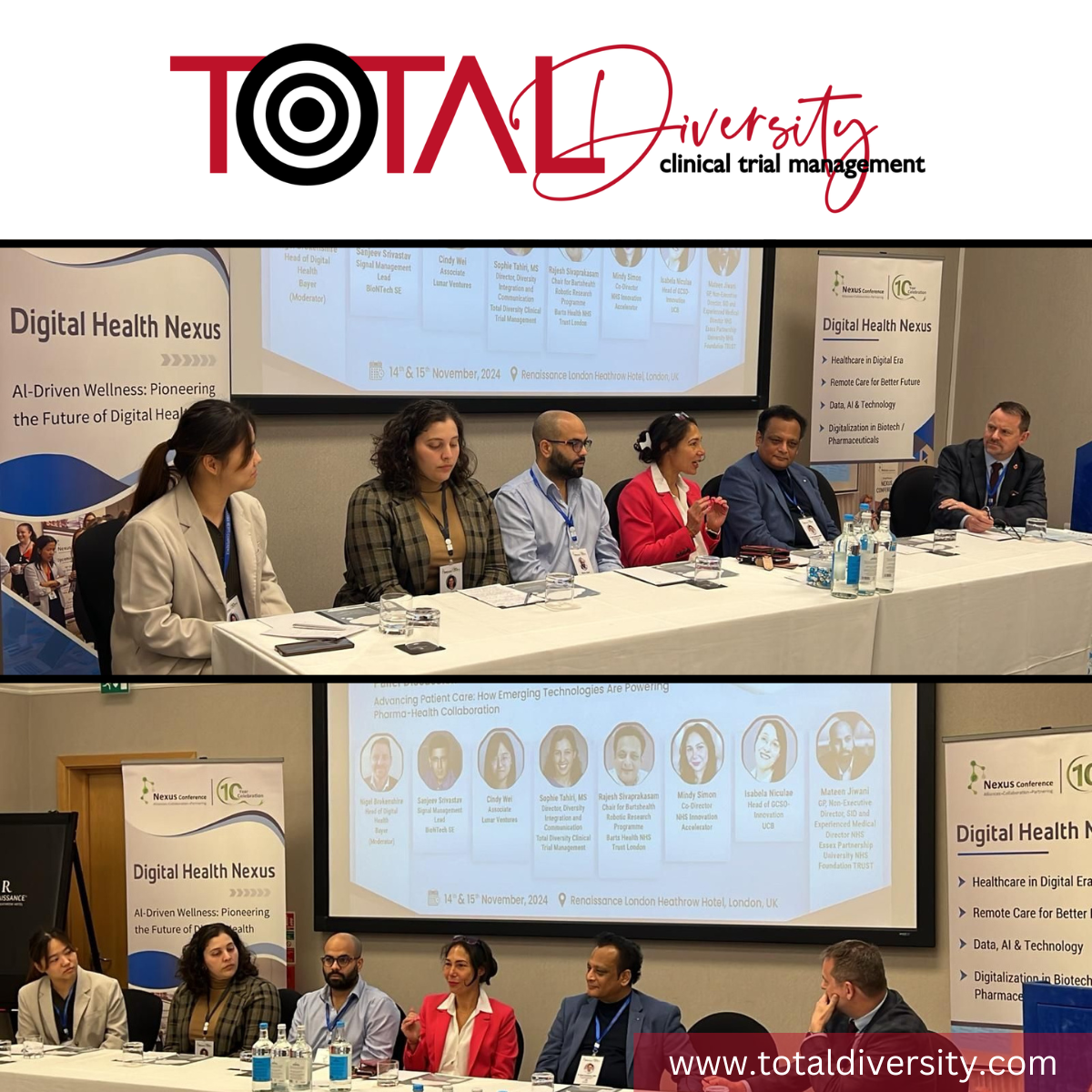The NEXUS Conference in London showcased emerging trends in digital health, equity in clinical trials, and the transformative potential of technology in healthcare delivery. Among the highlights was a focus on addressing disparities in clinical research and healthcare access, a theme that resonated deeply throughout the event.
Addressing Disparities with Digital Health
Director of Diversity Integration and Collaborations, Sophie Tahiri, spoke about “Disparities in Underrepresented Populations Using Digital Health Methods,” which explored the persistent gaps in clinical research representation and the role digital health innovations can play in addressing these challenges. Tools such as mobile apps, telehealth platforms, and electronic health records (EHRs) were spotlighted as mechanisms to improve access for underrepresented communities. For example, mobile apps designed to manage chronic conditions like diabetes can provide real-time monitoring and reminders for medication or appointments, significantly improving adherence in underserved populations with limited access to traditional healthcare. These tools can bridge gaps in care by connecting patients directly to resources, but their success hinges on thoughtful and inclusive implementation.
Insights from the Panel: Advancing Patient Care with Emerging Technologies
Sophie Tahiri also participated in the panel discussion, “Advancing Patient Care: How Emerging Technologies Are Powering Pharma-Health Collaboration,” which delved into the multifaceted approach required to overcome disparities in clinical research. The conversation highlighted several key points:
- Underrepresentation Remains a Barrier
Persistent disparities in clinical research compromise the quality of data and the effectiveness of treatments. Without diverse representation, the ability to draw meaningful, generalizable conclusions from research is limited.
- Digital Health Tools Expand Access
Technologies such as mobile apps and EHRs hold immense potential to reduce barriers to participation in clinical trials. They can streamline processes, increase reach, and improve communication. - Challenges Persist
Despite their benefits, digital health tools are not a panacea. Barriers such as language translation, limited rural access, and historical mistrust of the healthcare system continue to impede progress. - User-Centered and Culturally Sensitive Design is Critical
The success of any digital health initiative depends on its ability to meet the specific needs of its users. Culturally sensitive and user-friendly designs can help bridge gaps in trust and accessibility. - Community Involvement is Non-Negotiable
The principle of “No research about us without us” is paramount. Involving community members in every stage of research and tool development ensures relevance and builds trust. - A Holistic Approach is Essential
Addressing disparities requires consideration of clinical, financial, technical, and political factors. Each plays a critical role in ensuring equitable access and effective implementation.
Broader Takeaways from TCIS NEXUS
The conference underscored the importance of collaboration and innovation in tackling systemic issues. Key themes included:
- While digital health tools are promising, they must be implemented with care to avoid exacerbating existing inequities.
- Partnerships between technology developers, healthcare providers, and community advocates are crucial for meaningful change.
- The rapidly evolving healthcare landscape requires ongoing dialogue and flexibility to meet the needs of diverse populations.
Tech-Driven Trials: Revolutionizing Patient-Centric Design
Events like TCIS NEXUS serve as a reminder of the shared responsibility to advance equity in healthcare. Sophie Tahiri and Diana Foster co-authored the paper Tech-Driven Trials: Revolutionizing Patient-Centric Design in collaboration with CRIO and other industry leaders, exploring this critical topic. By thoughtfully leveraging technology, engaging communities, and addressing systemic barriers, the healthcare industry can make meaningful strides toward more inclusive and effective solutions.








